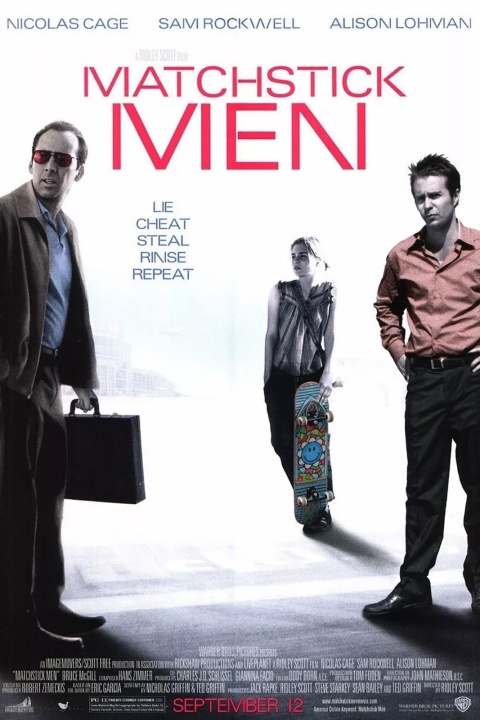Ridley Scott directs a rare crime-comedy in this sentimental flick starring an underrated Nicolas Cage as a germophobic con artist who must contend with the unexpected appearance of his long-lost daughter.

Review #2,462
Dir. Ridley Scott
2003 | USA/UK | Comedy/Drama/Crime | 116 mins | 2.39:1 | English
PG13 (passed clean) for thematic elements, violence, some sexual content and language
Cast: Nicolas Cage, Alison Lohman, Sam Rockwell
Plot: A phobic con artist and his protege are on the verge of pulling off a lucrative swindle when the former’s teenage daughter arrives unexpectedly.
Awards: –
Distributor: Warner
Accessibility Index
Subject Matter: Moderate – Father-Daughter Relationship; Conning & Scamming
Narrative Style: Straightforward
Pace: Normal
Audience Type: Slightly Mainstream
Viewed: DVD
Spoilers: No
Nicolas Cage in a Ridley Scott comedy? Why not? In this delightful work that doesn’t promise anything more than two hours of breezy entertainment, Scott finds himself an excuse to unwind after tackling more serious-minded fare like Gladiator (2000) and Black Hawk Down (2001).
It’s a rare sentimental comedy by a filmmaker known more for his spectacular action epics or sci-fi dystopias.
Matchstick Men doesn’t always work and feels one wrong step away from being out of tune, but with Cage giving a terrific central performance as Roy, a germophobic con artist who must contend with the unexpected appearance of his long-lost daughter, you can’t say that it is uncompelling.
Working with his partner-in-crime played by Sam Rockwell, they attempt to pull off a swindle that could dwarf even their most lucrative exploits.
“I’m not a criminal. I’m a con man.”
Enter the rebellious if inquisitive Alison Lohman (best known for White Oleander and Drag Me to Hell), Roy’s daughter in question, who inadvertently messes with their synergy.
Using an assortment of editing tricks and transition effects that feel dated now to create a fragmentary, anxiety-inducing mood that mirrors Roy’s state of mind, Scott finds a propulsive rhythm to the character’s debilitating obsessive-compulsive disorder, at least in the early stages of the film.
As the movie progresses, Scott returns to a more conventional and predictable style that focuses on the relationship between father and daughter.
In the film’s most memorable sequence, Roy teaches his daughter how to swindle a woman with a lottery ticket. I bet someone must have tested that out in real life.
Grade: B
Trailer:
Music:











